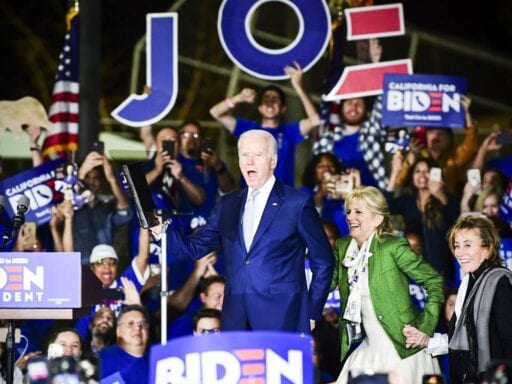Votes are still being counted, but here are updated Super Tuesday delegate numbers.
As votes are still being counted, here’s the total delegate count for Super Tuesday so far, powered by results from our partners at Decision Desk and the Virginia Center for Politics.
As of 10:15 pm Eastern Tuesday, the following numbers of Super Tuesday delegates have been awarded:
- Former Vice President Joe Biden: 119 delegates
- Sen. Bernie Sanders: 53 delegates
- Former New York City Mayor Mike Bloomberg: 7 delegates
- Sen. Elizabeth Warren: 5 delegates
These results will be updated throughout the night.
The magic number to win the Democratic Party’s nomination for president is 1,991 delegates. It could take months to officially get there, but Super Tuesday is when a large chunk are awarded.
Here are the latest totals of delegates that have been awarded since the start of the presidential nominating contest on February 3. You can also visit Vox’s delegate tracker.
- Biden: 216
- Sanders: 144
- Former South Bend, Indiana, Mayor Pete Buttigieg (dropped out): 26
- Warren: 14
- Bloomberg: 9
- Sen. Amy Klobuchar (dropped out): 7
The remaining presidential candidates are all competing for a majority of 3,979 pledged delegates; when Super Tuesday is done, 1,344 pledged delegates will be spoken for. It’s important to note we likely won’t know the final allotment for days or possibly weeks, as votes from California are counted.
Separately, there are also 771 automatic delegates, otherwise known as “superdelegates.” After a contentious 2016 primary, the Democratic National Committee changed its rules around superdelegates so they may now vote on the first ballot to select a nominee at the Democratic National Convention only if a campaign has secured a supermajority of pledged delegates. Otherwise, they weigh in during a second round of voting at the convention.
Candidates are competing for these delegates against a backdrop of complex rules: Delegates are awarded proportionally, and most states and districts require a minimum threshold of 15 percent of the primary or caucus vote to earn pledged delegates. This makes the contest a bit fairer but also means it’s harder to secure that magic number in a contested primary until much later in the year.
The Iowa caucuses officially kicked off the delegate race on February 3. But while the early states are all about gaining momentum, the race is ultimately about who can bag the most delegates and get to that magic number. Super Tuesday and the remaining March contests on the 10th and 17th will get us 61 percent of the way there.
This could all be over very quickly if one candidate racks up an insurmountable lead. Or it could drag on into the spring and summer, ahead of the Democratic National Convention in July.
Author: Ella Nilsen
Read More



